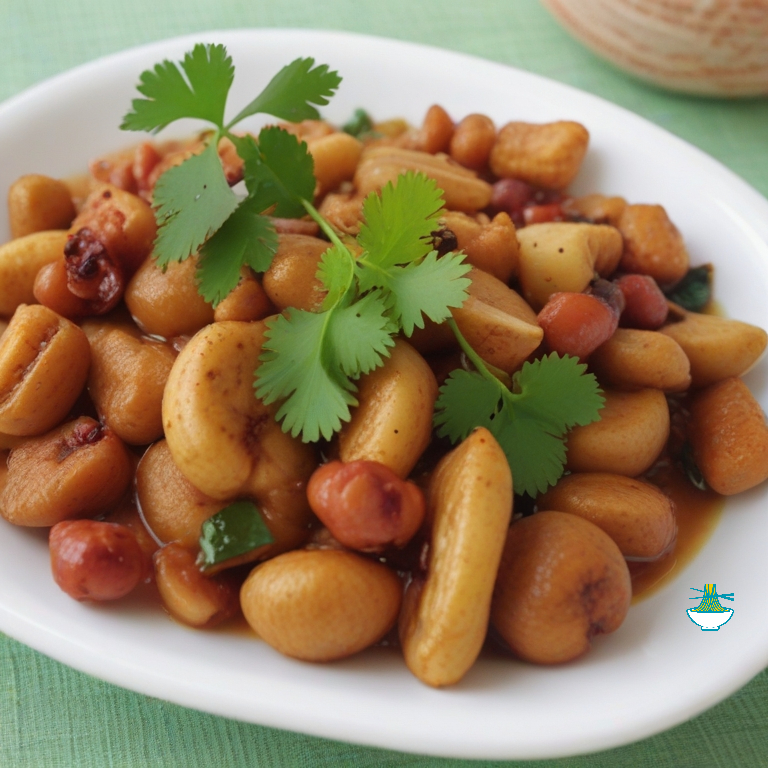Chikanda, a vegetarian dish originating from Zambia and other Southern African regions, showcases a rich culinary tradition rooted in indigenous ingredients. This nutritious dish is crafted from groundnuts (peanuts), wild orchid tubers, and a blend of aromatic spices.
-fotor-20240415165410_1719780403.jpg)
Chikanda's history dates back to traditional Zambian cooking practices, where local communities creatively utilized wild orchid tubers for sustenance and flavor. Over time, the dish has become a staple, reflecting Zambia's diverse culinary heritage and its reliance on locally available resources.
Ingredients:
- 1 cup groundnuts (peanuts), roasted and peeled
- 2 cups wild orchid tubers, peeled and grated
- 1 tablespoon vegetable oil
- 1 onion, finely chopped
- 2 tomatoes, chopped
- 1 teaspoon ground cumin
- 1 teaspoon paprika
- Salt to taste
- Water as needed
Instructions:
1. In a large bowl, combine the roasted and peeled groundnuts with the grated wild orchid tubers.
2. Heat vegetable oil in a pan over medium heat. Add the chopped onion and sauté until translucent.
3. Add the chopped tomatoes to the pan and cook until they soften.
4. Stir in the ground cumin, paprika, and salt. Cook for another minute to let the spices blend.
5. Pour the spiced tomato mixture over the groundnuts and tubers in the bowl. Mix well to combine all the ingredients evenly.
6. Gradually add water while mixing until you achieve a thick, dough-like consistency.
7. Shape the mixture into small balls or patties.
8. Steam the Chikanda balls or patties for about 20-25 minutes until cooked through.
9. Serve hot as a vegetarian dish, garnished with fresh herbs if desired.
Nutrition Value:
1. Groundnuts (peanuts), roasted and peeled:
- Calories: Approximately 828 kcal per cup
- Carbohydrates: About 24 grams
- Protein: Around 38 grams
- Fat: Roughly 72 grams
- Sodium: Negligible (depending on roasting method)
- Cholesterol: Zero
- Vitamins: Rich in vitamin E, niacin (B3), folate (B9), and pantothenic acid (B5)
- Minerals: Good source of magnesium, phosphorus, potassium, and zinc
- Health benefits: Provides healthy fats, protein, and essential nutrients, supports heart health, aids in weight management, and boosts energy levels.
2. Wild orchid tubers, peeled and grated:
- Calories: Varies depending on size and variety, approximately 100 kcal per cup
- Carbohydrates: About 24 grams
- Protein: Around 2 grams
- Fat: Almost zero
- Sodium: Minimal
- Cholesterol: Zero
- Vitamins: Contains vitamin C and B-complex vitamins like thiamine (B1) and riboflavin (B2)
- Minerals: Good source of potassium, calcium, and iron
- Health benefits: Low in calories, high in fiber, promotes digestive health, provides antioxidants, and supports immune function.
3. Vegetable oil (1 tablespoon):
- Calories: About 120 kcal per tablespoon
- Carbohydrates: Zero
- Protein: Zero
- Fat: Approximately 14 grams (mostly unsaturated fats)
- Sodium: Minimal
- Cholesterol: Zero
- Health benefits: Contains healthy unsaturated fats, essential for cell function, supports heart health, and provides vitamin E.
4. Onion, finely chopped:
- Calories: Around 46 kcal per medium-sized onion
- Carbohydrates: About 11 grams
- Protein: Around 1 gram
- Fat: Almost zero
- Sodium: Very low
- Cholesterol: Zero
- Vitamins: Rich in vitamin C, vitamin B6, and folate
- Minerals: Contains potassium, phosphorus, and magnesium
- Health benefits: Anti-inflammatory properties, supports immune system, and may help lower blood pressure.
5. Tomatoes, chopped (2 medium-sized):
- Calories: Approximately 44 kcal per medium-sized tomato
- Carbohydrates: About 10 grams
- Protein: Around 2 grams
- Fat: Almost zero
- Sodium: Very low
- Cholesterol: Zero
- Vitamins: High in vitamin C, vitamin A, and vitamin K
- Minerals: Contains potassium, manganese, and copper
- Health benefits: Rich in antioxidants, supports skin health, may reduce the risk of chronic diseases, and promotes heart health.
6. Ground cumin (1 teaspoon):
- Calories: About 8 kcal per teaspoon
- Carbohydrates: Around 1 gram
- Protein: Almost zero
- Fat: Almost zero
- Sodium: Very low
- Cholesterol: Zero
- Health benefits: Contains antioxidants, aids digestion, may help control blood sugar levels, and has anti-inflammatory properties.
7. Paprika (1 teaspoon):
- Calories: Approximately 6 kcal per teaspoon
- Carbohydrates: About 1 gram
- Protein: Almost zero
- Fat: Almost zero
- Sodium: Very low
- Cholesterol: Zero
- Health benefits: Rich in vitamin A, supports eye health, has anti-inflammatory properties, and may boost metabolism.
8. Salt (to taste):
- Calories: Zero
- Carbohydrates: Zero
- Protein: Zero
- Fat: Zero
- Sodium: Varies depending on amount added
- Cholesterol: Zero
- Health benefits: Essential for electrolyte balance, but excessive intake may contribute to high blood pressure.
Water:
- Calories: Zero
- Carbohydrates: Zero
- Protein: Zero
- Fat: Zero
- Sodium: Zero
- Cholesterol: Zero
- Health benefits: Essential for hydration, supports bodily functions, and aids digestion.
Overall, this recipe combines ingredients that offer a balance of nutrients, including protein, healthy fats, vitamins, minerals, and antioxidants, contributing to a nutritious and flavorful dish.


Comments